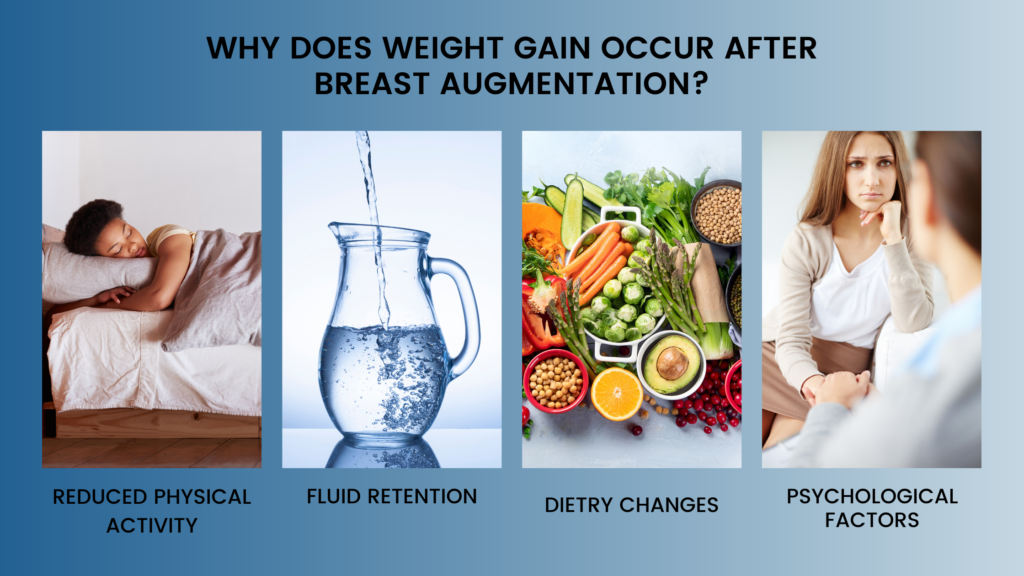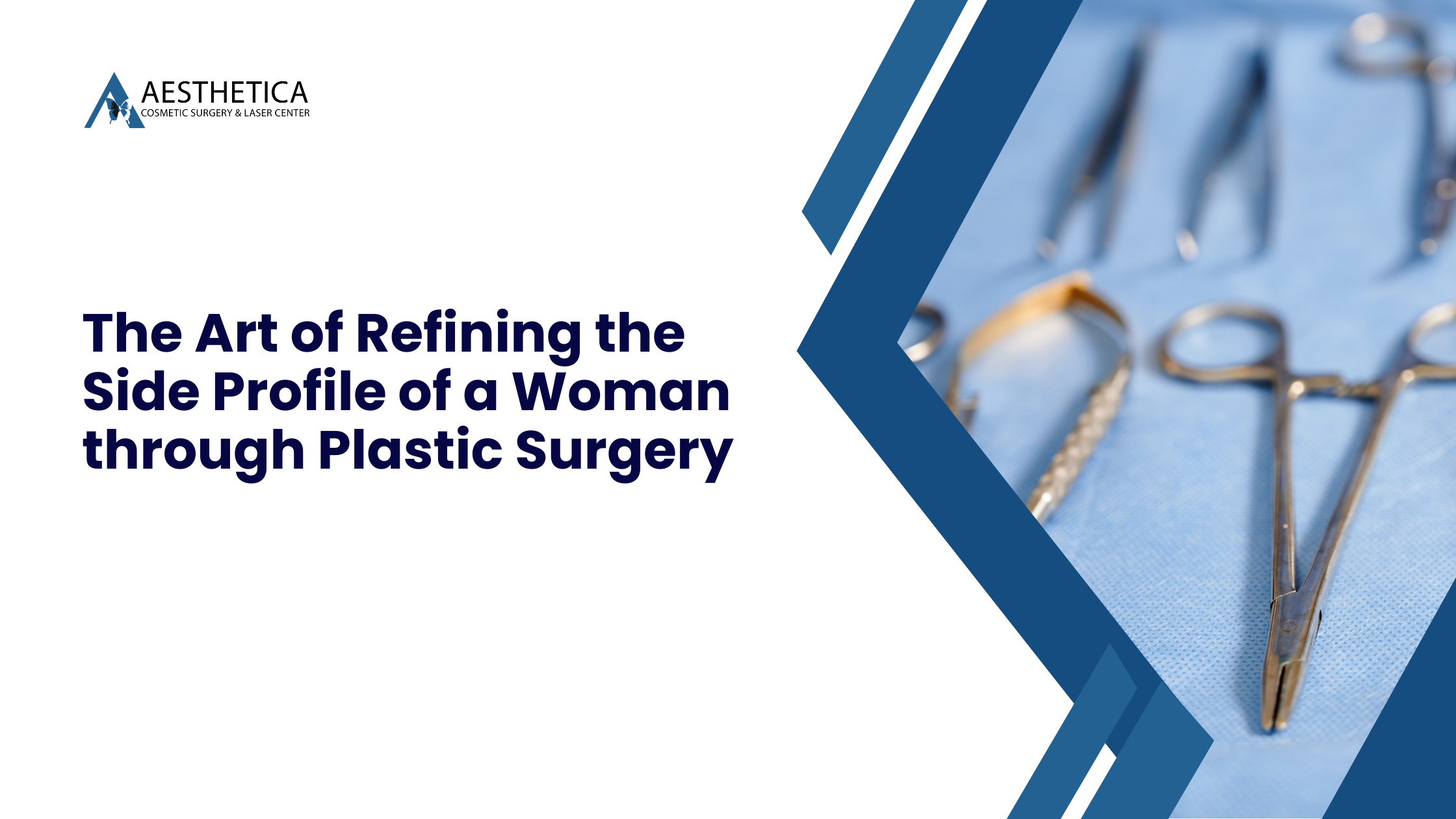Can Breast Implants Cause Weight Gain?7 min read

Aesthetica Editorial Team

In the ever-evolving world of cosmetic surgery, one question frequently asked by patients who are undergoing breast augmentation is, “Can breast implants cause weight gain?”
Here at Aesthetica, we’re here to explore the various aspects and provide insights to help you understand the correlation, if any, between breast implants and weight gain.
Understanding Breast Implants and Body Weight
First, it’s crucial to understand what breast implants are and how they are placed. Breast implants are medical devices implanted under breast tissue or chest muscles to increase breast size (augmentation) or to replace breast tissue that has been removed due to cancer or trauma (reconstruction). They are made from saline (salt water solution) or silicone gel.
Regarding body weight, it’s important to clarify that breast implants have a specific weight. However, the weight of implants is generally negligible in terms of overall body weight. For instance, a typical silicone implant weighs around 1 pound (0.45 kg). This slight increase in weight is usually not perceptible in terms of overall body weight.
The Myth of Implants and Weight Gain
A common myth is that getting breast implants will lead to significant weight gain. This is largely unfounded. While it’s true that your scale might reflect a slight increase due to the weight of the implants, this is usually a minor change. The perception of weight gain might also stem from the increased breast size and the psychological impact of seeing a more prominent figure in the mirror.
Why Does Weight Gain Occur after Breast Augmentation?

A critical question arises: why do some individuals experience weight gain following breast augmentation? There are several factors at play here:
- Reduced Physical Activity: During the recovery phase, your activity levels may decrease, which can lead to a minor weight gain if your calorie intake remains unchanged.
- Fluid Retention: The body’s natural response to surgery can include retaining fluid, which adds temporary weight.
- Dietary Changes: Comfort eating or not following a balanced diet during recovery can contribute to weight changes.
- Psychological Factors: Changes in body image and the healing process can influence eating and activity habits.
Post-Surgery Swelling: A Temporary Issue
It’s important to note that after breast implant surgery, patients often experience swelling, which can contribute to a temporary feeling of weight gain.
This swelling is a normal part of the healing process and typically subsides within a few weeks. Compression garments and proper post-operative care are crucial in managing this swelling.
The Role of Lifestyle in Post-Implant Weight Changes
Lifestyle factors play a significant role in any weight changes after surgery. Post-surgery, patients may become less active during the recovery period, which can lead to weight gain if dietary habits remain unchanged.
Thus, as a healthcare professional recommends, maintaining a balanced diet and gradually resuming exercise is essential.
Understanding the Recovery Phase
Post-surgery, your body needs time to heal. This healing process often requires a period of reduced physical activity. It’s a crucial phase where the body is mending itself, so it’s normal for your usual exercise routines to be put on pause. However, this decrease in activity can have implications for your weight.
Activity Level and Weight Management
Decreased physical activity can lead to a lower overall calorie expenditure during recovery. If your dietary intake remains the same as when you were more active, this could lead to weight gain. The body’s metabolism is temporarily adjusting to a more sedentary lifestyle, which means calorie needs may be slightly lower.
Importance of a Balanced Diet
A balanced diet plays a pivotal role during this time. It’s not just about calorie control; it’s about providing your body with the nutrients it needs to heal and maintain energy levels. Focus on foods rich in protein, vitamins, and minerals to support the healing process. Incorporating fruits, vegetables, lean proteins, and whole grains can help maintain a healthy weight and promote recovery.

Mindful Eating Habits
It’s also important to be mindful of emotional eating during recovery. Changes in body image, combined with the stress of surgery and recovery, can sometimes lead to comfort eating. Awareness of these tendencies and finding healthy ways to cope with emotions is critical.
Gradually Resuming Exercise
As your body heals, gradually reintroducing exercise is essential. This should be done in consultation with your healthcare professional, who can guide you on when and how to start moving more safely. Starting with gentle activities like walking can help kickstart your metabolism while keeping the healing process on track
The Psychological Aspect
There’s also a psychological component to consider. The change in physical activity and diet, along with adapting to a new body image, can be challenging. Giving yourself grace during this time and seeking support if needed is essential.
Long-Term Lifestyle Adaptation
Once fully recovered, adopting a lifestyle supporting your new body is crucial. This means finding a balance of exercise and diet that works for you, considering your body’s changes. Regular check-ins with your healthcare provider can help you stay on track and make any necessary adjustments.

Exercise and Breast Implants: Finding the Balance
Post-surgery, it’s important to ease back into your exercise routine. Engaging in light exercises, like walking, can start as soon as you feel comfortable. However, you should wait until your doctor gives you the green light before returning to more strenuous activities. Regular exercise can help maintain a healthy weight and contribute to overall well-being.
Nutritional Considerations for Optimal Health
A balanced diet plays a crucial role in maintaining your weight post-surgery. Consuming a diet rich in fruits, vegetables, lean proteins, and whole grains is recommended. Hydration is also vital. Adequate water intake can aid in the healing process and help maintain a healthy weight.
Regular Check-Ups: Ensuring Long-Term Success
Regular follow-ups with your surgeon are vital to monitor the condition of your implants and overall health. These check-ups can guide you in managing your weight and addressing any concerns about your implants.
While breast implants add some weight, they are not a direct cause of significant weight gain. Factors like post-surgery swelling, lifestyle changes, and personal health habits play more critical roles in any weight changes observed after surgery. With proper care, nutrition, and exercise, individuals can maintain their desired weight post-surgery.

Begin Your Breast Augmentation Journey in Northern Virginia Today!
Ready to embark on your journey towards aesthetic enhancement? Aesthetica is your ultimate guide.
Meet us at 19500 Sandridge Way, Suite 350, Leesburg, VA 20176, or call us at (703) 574-4342 for a complimentary consultation with Board-Certified Plastic Surgeon Dr. Phillip Chang before moving forward with your procedure. If everything matches up, our team will help you navigate the entire process from beginning to end. Also, remember to check out our blog and social media for more information on cosmetic surgery trends!
Let Us Help You!
Our office can provide you with helpful information, schedule a free consultation, and walk you through the many services and procedures we provide.
Contact Dr. Chang's Office:
More Articles For You

The Latest Techniques in Double Chin Removal in Leesburg, VA
In the charming town of Leesburg, VA, where looking good and feeling great are top

The Art of Refining the Side Profile of a Woman through Plastic Surgery
In the realm of cosmetic enhancements, the side profile of a woman holds a pivotal

Enhance Now, Pay Later: Plastic Surgery Payment Plans in Leesburg, VA
In the picturesque town of Leesburg, VA, pursuing beauty and self-improvement is a journey many

Areola Reduction for Men in Loudoun County
In the heart of Loudoun County, where the beauty of nature meets bustling urban life,
